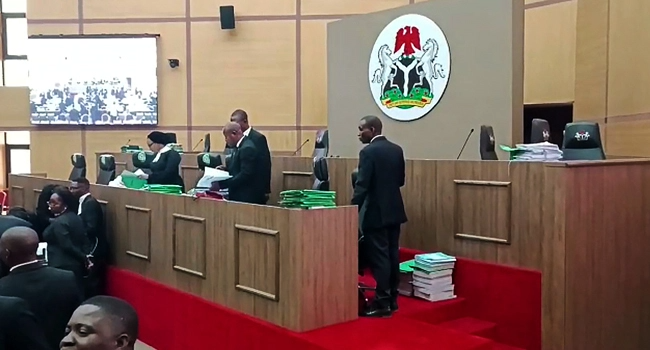Nigerians from all works of life, including consumers and business owners, professional and trade unions, looking up to the Supreme Court for a pronouncement that will ameliorate the precarious financial situation they are currently enmeshed in would have to wait a little longer.
The highest court in the land said yesterday that it will resist being used as a scapegoat in the scuffle over scarcity of Naira notes occasioned by the Naira swap policy of the Central Bank of Nigeria (CBN).
Accordingly, it fixed March 3, 2023 for judgement in the suit filed by three states against the federal government over the Naira swap policy.
Justice Inyang Okoro of the apex court fixed the date after taking arguments from counsel in the matter.
The government of Kaduna, Kogi and Zamfara states haf dragged the attorney-general of the federation (AGF), Abubakar Malami (SAN) and the CBN before the court challenging the deadline for the use of old Naira notes.
During proceedings yesterday, the apex court, whole eacting to a plea from the attorney-general of Lagos State, Moyosore Onigbanjo, against the AGF and Justice minister, said it cannot be a victim of scapegoatism.
Onigbanjo accused Malami of acting in contempt of initial court orders, praying Justice Okoro to prohibit the attorney-general of the federation from representing the federal government that was sued by 10 state governments over handling of the deadline to phase out the old Naira notes.
“You are not a stranger to this country. We don’t want a situation where the judiciary will be a scapegoat. We refuse to be the scapegoat,” his Lordship stated categorically.
“We are hearing about this matter today. We don’t intend to keep this matter longer… whether they obey it or not,” Justice Okoro added.
At the last adjourned date, more states had joined as plaintiffs in the matter, just as the apex court made an order stopping the federal government from going ahead with the policy.
On February 8, the Supreme Court stopped the CBN from giving effect to the deadline on the use of old notes after an ex parte application was brought by the three states.
In the suit before the apex court, the states argued that the implementation of the policy has caused untold hardship on residents.
But the AGF filed a preliminary objection to the suit, arguing that the Supreme Court lacks the jurisdiction to entertain the matter.
In the objection, the AGF said the plaintiffs failed to join the CBN in the suit, which had just the him as the sole plaintiff.
Ondo, Ekiti, Katsina, Ogun, Cross River, Lagos, and Sokoto states also joined the suit as co-plaintiffs, while Edo and Bayelsa States joined the AGF as defendants.





